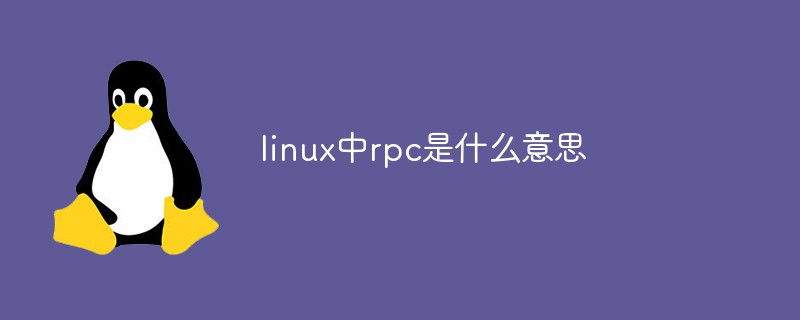 Operation and Maintenance
Operation and Maintenance Linux Operation and Maintenance
Linux Operation and Maintenance In the Linux environment, what operations may cause thread switching?
In the Linux environment, what operations may cause thread switching?
Linux uses a one-to-one thread model, and the difference between user thread switching and kernel thread switching is very small. At the same time, if you ignore the overhead caused by the user voluntarily giving up the execution rights (yield) of the user thread, you only need to consider the overhead of kernel thread switching. (Recommended learning: linux tutorial )
## 注意 Note that it is just to help the simplification of understanding. In fact, the user thread library does a lot of work in the scheduling and synchronization of user threads, and this cost cannot be ignored. For example, the JVM explains Thread#yield(): If the underlying OS does not support the semantics of yield, the JVM will let the user thread spin until the end of the time slice, and the thread will be passively switched to achieve a similar effect.What causes thread switching
Time slice rotationThread blockingThread actively gives up time sliceDirect overhead
Direct overhead is caused by the thread switching itself, which is inevitable and inevitable.Switching between user mode and kernel mode
Thread switching can only be completed in kernel mode. If the current user is in user mode, it will inevitably cause a conflict between user mode and kernel mode. switch. (What are the specific costs of "switching between user mode and kernel mode"???)Context switching
As mentioned earlier, thread (or process) information needs to be saved with a task_struct. When switching threads, it is necessary to cut out the task_struct of the old thread from the kernel and cut in the new thread to bring about context switching. In addition, it is also necessary to switch registers, program counters, thread stacks (including operation stacks, data stacks), etc.Thread Scheduling Algorithm
Thread scheduling algorithm needs to manage the status of threads, waiting conditions, etc. If it is scheduled according to priority, it also needs to maintain a priority queue. If thread switching is frequent, this cost cannot be underestimated.Indirect overhead
Indirect overhead is a side effect of direct overhead and depends on system implementation and user code implementation.Cache Missing
Switching process requires the execution of new logic. If the address spaces accessed by the two are not similar, cache misses will occur. The specific impact depends on the system implementation and user code implementation. If the system's cache is larger, the impact of cache misses can be reduced; if the address spaces where user threads access data are close to each other, the cache miss rate itself will also be relatively low.The above is the detailed content of In the Linux environment, what operations may cause thread switching?. For more information, please follow other related articles on the PHP Chinese website!
 什么是linux设备节点Apr 18, 2022 pm 08:10 PM
什么是linux设备节点Apr 18, 2022 pm 08:10 PMlinux设备节点是应用程序和设备驱动程序沟通的一个桥梁;设备节点被创建在“/dev”,是连接内核与用户层的枢纽,相当于硬盘的inode一样的东西,记录了硬件设备的位置和信息。设备节点使用户可以与内核进行硬件的沟通,读写设备以及其他的操作。
 Linux中open和fopen的区别有哪些Apr 29, 2022 pm 06:57 PM
Linux中open和fopen的区别有哪些Apr 29, 2022 pm 06:57 PM区别:1、open是UNIX系统调用函数,而fopen是ANSIC标准中的C语言库函数;2、open的移植性没fopen好;3、fopen只能操纵普通正规文件,而open可以操作普通文件、网络套接字等;4、open无缓冲,fopen有缓冲。
 linux中什么叫端口映射May 09, 2022 pm 01:49 PM
linux中什么叫端口映射May 09, 2022 pm 01:49 PM端口映射又称端口转发,是指将外部主机的IP地址的端口映射到Intranet中的一台计算机,当用户访问外网IP的这个端口时,服务器自动将请求映射到对应局域网内部的机器上;可以通过使用动态或固定的公共网络IP路由ADSL宽带路由器来实现。
 linux中eof是什么May 07, 2022 pm 04:26 PM
linux中eof是什么May 07, 2022 pm 04:26 PM在linux中,eof是自定义终止符,是“END Of File”的缩写;因为是自定义的终止符,所以eof就不是固定的,可以随意的设置别名,linux中按“ctrl+d”就代表eof,eof一般会配合cat命令用于多行文本输出,指文件末尾。
 linux怎么判断pcre是否安装May 09, 2022 pm 04:14 PM
linux怎么判断pcre是否安装May 09, 2022 pm 04:14 PM在linux中,可以利用“rpm -qa pcre”命令判断pcre是否安装;rpm命令专门用于管理各项套件,使用该命令后,若结果中出现pcre的版本信息,则表示pcre已经安装,若没有出现版本信息,则表示没有安装pcre。
 什么是linux交叉编译Apr 29, 2022 pm 06:47 PM
什么是linux交叉编译Apr 29, 2022 pm 06:47 PM在linux中,交叉编译是指在一个平台上生成另一个平台上的可执行代码,即编译源代码的平台和执行源代码编译后程序的平台是两个不同的平台。使用交叉编译的原因:1、目标系统没有能力在其上进行本地编译;2、有能力进行源代码编译的平台与目标平台不同。
 linux怎么查询mac地址Apr 24, 2022 pm 08:01 PM
linux怎么查询mac地址Apr 24, 2022 pm 08:01 PMlinux查询mac地址的方法:1、打开系统,在桌面中点击鼠标右键,选择“打开终端”;2、在终端中,执行“ifconfig”命令,查看输出结果,在输出信息第四行中紧跟“ether”单词后的字符串就是mac地址。
 linux中rpc是什么意思May 07, 2022 pm 04:48 PM
linux中rpc是什么意思May 07, 2022 pm 04:48 PM在linux中,rpc是远程过程调用的意思,是Reomote Procedure Call的缩写,特指一种隐藏了过程调用时实际通信细节的IPC方法;linux中通过RPC可以充分利用非共享内存的多处理器环境,提高系统资源的利用率。


Hot AI Tools

Undresser.AI Undress
AI-powered app for creating realistic nude photos

AI Clothes Remover
Online AI tool for removing clothes from photos.

Undress AI Tool
Undress images for free

Clothoff.io
AI clothes remover

AI Hentai Generator
Generate AI Hentai for free.

Hot Article

Hot Tools

SublimeText3 Chinese version
Chinese version, very easy to use

Dreamweaver Mac version
Visual web development tools

WebStorm Mac version
Useful JavaScript development tools

Notepad++7.3.1
Easy-to-use and free code editor

SecLists
SecLists is the ultimate security tester's companion. It is a collection of various types of lists that are frequently used during security assessments, all in one place. SecLists helps make security testing more efficient and productive by conveniently providing all the lists a security tester might need. List types include usernames, passwords, URLs, fuzzing payloads, sensitive data patterns, web shells, and more. The tester can simply pull this repository onto a new test machine and he will have access to every type of list he needs.





